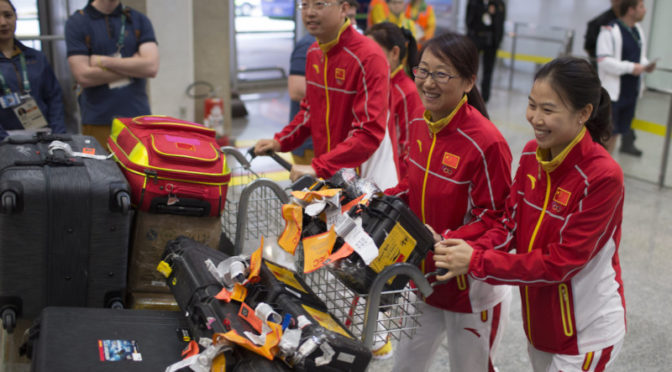China’s largest ever Olympic contingent of 411 athletes has brought expectations for a sizeable medal haul to Brazil. But with with local issues compounded by some wider – and more worrying – trends, it is no exaggeration to say that the Rio Olympics are facing potentially fatal headwinds.
The Rio Olympics are shaping up to be the most pivotal of recent times.
Not because the sporting action is any more anticipated than at previous Games – far from it – but because the Olympic concept has taken so many knocks in recent years that the very credibility of the Games is under threat.
In fairness, there has been criticism in the build-up to all Olympic Games in recent memory. This happens largely because the hordes of international media are on site days before the Games kick off and have to file daily stories with little or no sporting action to discuss. But, while some may disagree, the build-up to Rio does seem worse than normal.
Locally, health has been a big concern with the Zika virus seeing a number of high-profile withdrawals – mostly notably the top four male golfers in the world – even though the official line from the IOC and its health experts has been that there is nothing to worry about.

Additionally, the water in the bay in which some of the athletes will be swimming has been criticized for being more sewer than swimming pool. More recently, the sub-standard accommodation has been a favorite target – as it was in Sochi two years ago.
Safety has been another big area of concern ahead of the Rio Olympics, with the localized fears of kidnapping, robberies and scams added to the wider global threat of terrorism. Just this week, parts of the torch relay in and around Rio were abandoned as police used pepper spray on protesters.
Unusually, perhaps, Chinese athletes – and fans – have also been complaining on social media, with some joking that the athletes’ biggest challenge will be simply to return home alive.
But the pressure has been building on China’s athletes and officials alike. Liu Peng, head of China’s Olympic Committee, who last year stated that China must ditch its obsession with gold medals is now taking a rather different approach now that the competition is imminent.

In a clever way to deflect attention away from the athletes, Liu has been focusing on China’s opponents, saying that the country will face sterner competition in some of the disciplines it traditionally dominates, such as diving and gymnastics. China will still, no doubt, see success across a range of sports including many of its historic strongholds, but Liu Peng’s comments prove that – in China as elsewhere – national team funding has to be justified by medals.
It is the issue of doping, however, that has arguably created the biggest cloud for the Rio Olympics.
By refusing to issue a blanket ban on Russian athletes for state-sponsored doping, the IOC has transferred the burden to individual sporting federations. While arguing that this is somehow more fair to those affected, the result has done nothing to repair the damaged reputation of the Olympics. The IOC’s latest attempt to blame WADA for the timing of its report into Russia’s offenders comes across as petty, irrelevant and just another example of passing the buck.
Athletics – the showpiece event of the Games – already has its credibility in tatters after years of positive drug tests, typically in the sprints, middle-distance and throws. If the Rio Olympics fail to win over sports fans from around the world, the Games may lose their relevancy forever.
An abridged version of this article first appeared here.


